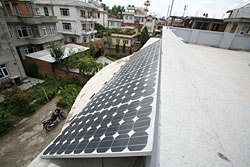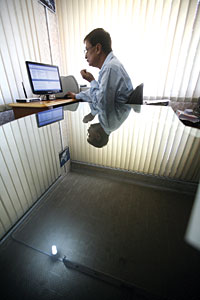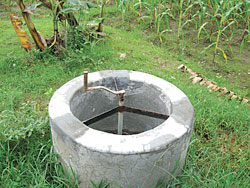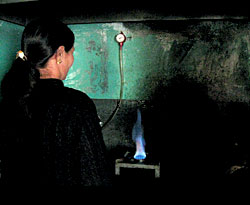 PICS: KIRAN PANDAY POWER PANELS: The eight solar panels installed at ECCA Nepal building which keep the office running even during load shedding. |
Surendra Mathema is already doing it with his 200 watt system that lights up his house and even powers the tv. He has installed six panels on his roof at a cost of approximately Rs 300,000. In Sitapaila Mukunda Bhattarai has built himself a completely renewable house , powered by a windmill and solar panels. He recycles as much as possible in his compost unit, uses biogas for the kitchen and harvests water from his roof.
"Shortage of electricity is going to be a problem every winter in Nepal for at least 10 years, the demand exceeds supply by a long shot. Solar is the best option," says Jay Raj Bhandari, director of ECCA Nepal which has an office powered by a solar unit on the roof.
Kamal Rupakheti, of German Nepalese Help Association, has a small office and has installed two solar panels to power two computers, a fax machine and a laser printer. The two panels and a battery system cost Rs 120,000 but pay for themselves in a few years, Rupakheti says.
 NO WORRIES: Although the lights are out in the area, Kamal Rupakheti of German-Nepalese Help Association continues working on his PC under the light of CFL bulbs, both powered by solar technology. |
Basanta Kumar of Himsuli says solar is catching on. His company has sold nearly 120 solar systems. "Most of the new houses have designs that incorporate a separate solar wiring for solar," he says.
Despite the initial cost of Rs 30,000 for one 75 watt panel, the photo-voltaic cells come with a 25 year guarantee. The batteries last at least five years if maintained properly. And, international prices for solar cells may decrease from $3.25 per watt to $2 per watt. A government tax rebate for solar systems in urban areas has helped boost sales just as a subsidy for rural solar tukis spread its use in the districts.
Rhesa Piya of the Energy Sector Assistance Program (ESAP) sees great potential for solar power in Nepal. She says: "It is a great alternative until hydropower is regular. It is god-gifted, and the sun shines at least 300 days in a year."
Costs for Solar:
Rs 1000-1500 per watt
1 panel approx Rs 30,000 for 75 watts (at least 12 lights can run on 1 panel)
Lotus Energy- 4418203
ESAP-5539390
ECCA Nepal-553870
Himsuli energy and planning- 9851013688
Green prisons
Use of biogas improves lives inside prisons
MALLIKA ARYAL in KASKI
 PICS: MALLIKA ARYAL |
Kaski, Kanchanpur and Chitwan prisons were all renovated last year by Nepal's International Committee of the Red Cross and the Prison Management Department . They have all been equipped with biogas plants and gas-stoves.
"While domestic use of biogas is well known, this is a perfect example of how biogas can also be successfully used in large scale institutional settings," says Gisella McGuinness, co-coordinator of the Water and Habitat section of the ICRC, which has taken on the initiative in the three prisons. "The project seeks to ensure cleanliness, good health, self-sufficiency environmental preservation and relieves economic pressure on the inmates and their families in terms of fuel, as a result they can access nutritional food," adds ICRC's Rafiullah Qureshi.
 |
Kaski prison's jailer Uma Kanta Poudel says that equipping the prison was only the first step and it's now up to the government to ensure sustainability by providing the expertise and budget for maintenance and repairs. "It is the responsibility of the government to ensure acceptable living conditions of detainees in prison. They should replicate and take a lead role in projects like these in the future," he says.
Rain check
ROMA ARYAL
 PHILIPPE MARTIN SOAKING IN: The rainwater harvesting system installed at the Alliance Fran?aise supplies water for the entire office. |
With the scarcity of water becoming a persistent problem in the Valley, the Alliance Fran?aise, a language institute and event organiser, has introduced a rainwater harvesting system at its office in Tripureswor, which is visited by at least 450 people a week.
"Within the first three weeks alone," says Philippe Martin, director of the Alliance Fran?aise, "we saved 2,000 litres of water. For the first time, we had more water than we needed." And, in only two days of heavy rainfall this week, another 6,000 litres was collected. Rainwater is used in the office for the toilets and even for cooking and drinking once it has been through a double filtration process.
The system is simple?a single roof with a surface area of 65 sq m roof has been prepared for collecting water, which is linked to two 3,000 litre tanks and a 2,000 litre tank.
Bhusan Tuladhar, executive director of the Environment and Public Health Organisation (ENPHO) Nepal that helped install the rainwater harvesting system says, "The advantage is that it's relatively cheap and you don't have to depend on the erratic water supply from the mains."
The total cost for the system at the Alliance Fran?aise, amounted to around Rs 40,000, but costs will soon be covered with the amount they're already saving per month now that they are relying solely on rainwater and water drawn from the well rather than tanker deliveries. On an average, a system to store rainwater for four months after the monsoon costs Rs 30,000 for a 7,500 litre tank.
"The only catch is storage, especially during the dry months," says Tuladhar. The Alliance Fran?aise has that figured out, but another option is to direct rainwater to the well and recharge groundwater instead.
Martin is already planning to make the rest of the roofs in the compound suitable for harvesting rainfall. "We already had an awareness campaign planned for environment day," says Martin "but we installed the rainwater harvesting system to do what we were talking about and show people how easy it really is."
He is optimistic about others too: "As people realise how easy it is, maybe in a couple of years rainwater harvesting systems will be as prevalent as solar panels have become."
The Alliance Francaise is hosting a round table and lecture by ENPHO and screening the film Home on 5 June at the Alliance Fran?aise, Tripureswor. Free entry. For schedule: www.alliancefrancaise.org.np
SEE ALSO:
"Here comes the rain," #301


